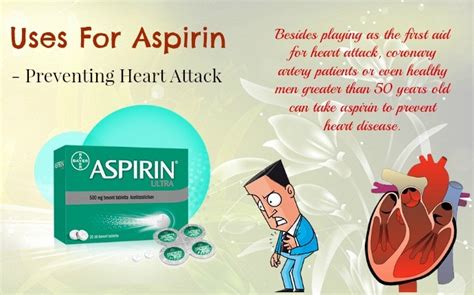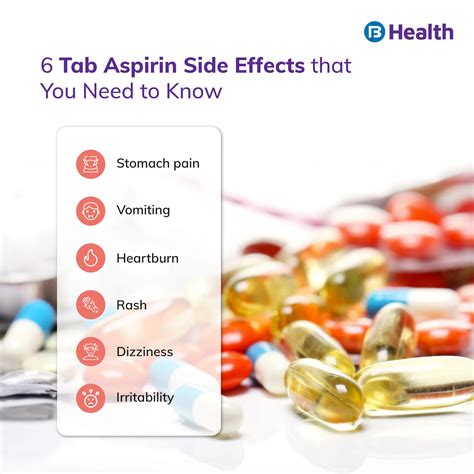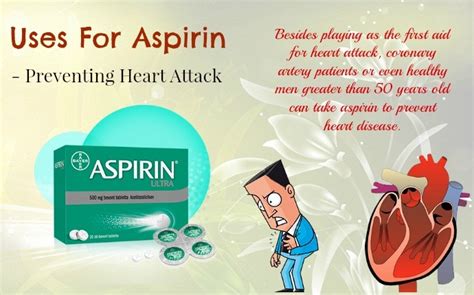Intro
Discover how aspirin helps prevent heart attacks, reducing cardiovascular risk with daily low-dose therapy, and learn about its benefits, side effects, and interactions for heart health.
The use of aspirin for heart attack prevention has been a topic of discussion among medical professionals and the general public for decades. With heart disease being one of the leading causes of death worldwide, finding effective ways to prevent heart attacks is crucial. Aspirin, a common over-the-counter medication, has been found to have potential benefits in reducing the risk of heart attacks, but its use must be carefully considered due to potential side effects. In this article, we will delve into the importance of heart attack prevention, the role of aspirin in this process, and what individuals can do to protect their heart health.
Heart disease is a condition that affects the blood vessels and heart, leading to potentially life-threatening complications such as heart attacks and strokes. The risk factors for heart disease include high blood pressure, high cholesterol, smoking, obesity, and a family history of heart disease. Given the severity of heart disease, prevention is key, and this is where aspirin comes into play. Aspirin has anti-inflammatory and blood-thinning properties, which can help prevent the formation of blood clots that can cause heart attacks.
The idea of using aspirin for heart attack prevention is based on its ability to prevent blood clots from forming. When a blood clot forms in a blood vessel, it can block the flow of blood to the heart, leading to a heart attack. Aspirin works by inhibiting the production of thromboxane A2, a chemical that promotes blood clotting. By taking aspirin regularly, individuals can reduce their risk of developing blood clots and, in turn, reduce their risk of having a heart attack. However, it is essential to note that aspirin is not suitable for everyone, and its use should be discussed with a healthcare provider before starting a regimen.
Benefits of Aspirin for Heart Attack Prevention

However, it is crucial to weigh the benefits of aspirin against the potential risks. Aspirin can cause stomach upset, bleeding, and other side effects, particularly when taken in high doses or for extended periods. Furthermore, aspirin may not be suitable for individuals with certain medical conditions, such as bleeding disorders or kidney disease. Therefore, it is essential to consult with a healthcare provider before starting an aspirin regimen to discuss the potential benefits and risks.
Risks and Side Effects of Aspirin

Other potential side effects of aspirin include allergic reactions, ringing in the ears, and kidney damage. In rare cases, aspirin can cause a condition called Reye's syndrome, which is a serious neurological disorder that can occur in children and teenagers. Additionally, aspirin can interact with other medications, such as blood thinners and diabetes medications, which can increase the risk of side effects.
Who Should Take Aspirin for Heart Attack Prevention?
The decision to take aspirin for heart attack prevention should be made in consultation with a healthcare provider. Aspirin is generally recommended for individuals who have a high risk of developing heart disease, such as those with a family history of heart disease, high blood pressure, or high cholesterol. Additionally, aspirin may be recommended for individuals who have already experienced a heart attack or have a history of cardiovascular events.However, aspirin is not suitable for everyone. Individuals with certain medical conditions, such as bleeding disorders or kidney disease, should avoid taking aspirin due to the risk of side effects. Pregnant women and children under the age of 18 should also avoid taking aspirin, as it can increase the risk of Reye's syndrome and other complications.
Alternatives to Aspirin for Heart Attack Prevention

Lifestyle changes, such as maintaining a healthy diet, exercising regularly, and quitting smoking, can also help reduce the risk of heart attacks. A healthy diet that is low in saturated fats, sodium, and added sugars can help lower cholesterol levels and blood pressure, reducing the risk of heart disease. Regular exercise can also help improve cardiovascular health, reduce stress, and boost overall well-being.
Lifestyle Changes for Heart Attack Prevention
Making lifestyle changes is an essential part of heart attack prevention. A healthy diet, regular exercise, and stress management can all help reduce the risk of heart disease. Here are some lifestyle changes that can help:- Maintain a healthy diet that is low in saturated fats, sodium, and added sugars
- Exercise regularly, aiming for at least 30 minutes of moderate-intensity exercise per day
- Quit smoking and avoid exposure to secondhand smoke
- Manage stress through techniques such as meditation, yoga, or deep breathing exercises
- Get enough sleep, aiming for 7-8 hours per night
Conclusion and Next Steps

If you are concerned about your heart health or have questions about aspirin for heart attack prevention, we encourage you to speak with your healthcare provider. They can help you determine the best course of action for your individual needs and provide guidance on how to reduce your risk of heart disease.
What are the benefits of taking aspirin for heart attack prevention?
+The benefits of taking aspirin for heart attack prevention include reducing the risk of heart attacks by up to 30% and preventing blood clots from forming.
Who should take aspirin for heart attack prevention?
+Aspirin is generally recommended for individuals who have a high risk of developing heart disease, such as those with a family history of heart disease, high blood pressure, or high cholesterol.
What are the potential side effects of taking aspirin for heart attack prevention?
+The potential side effects of taking aspirin for heart attack prevention include bleeding, stomach upset, and allergic reactions.
We hope this article has provided you with valuable information on the use of aspirin for heart attack prevention. Remember to always consult with your healthcare provider before starting any new medication or making significant changes to your lifestyle. By working together, we can reduce the risk of heart disease and promote overall health and well-being. If you have any further questions or concerns, please do not hesitate to reach out. Share this article with your friends and family to help spread awareness about the importance of heart health.
